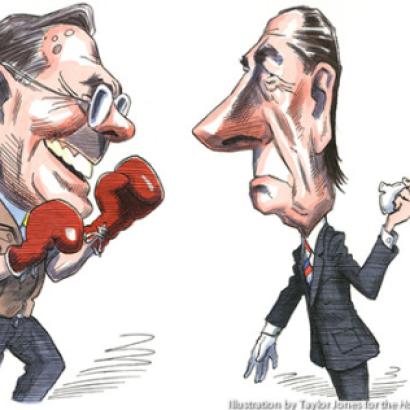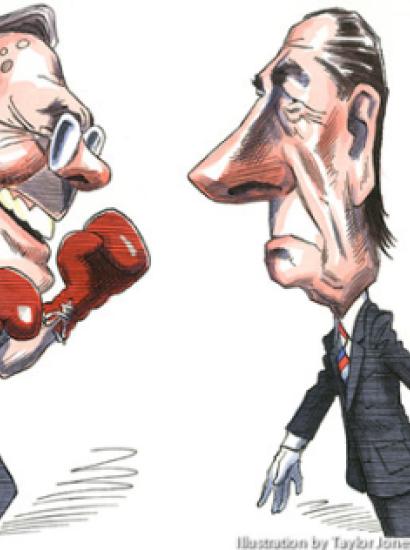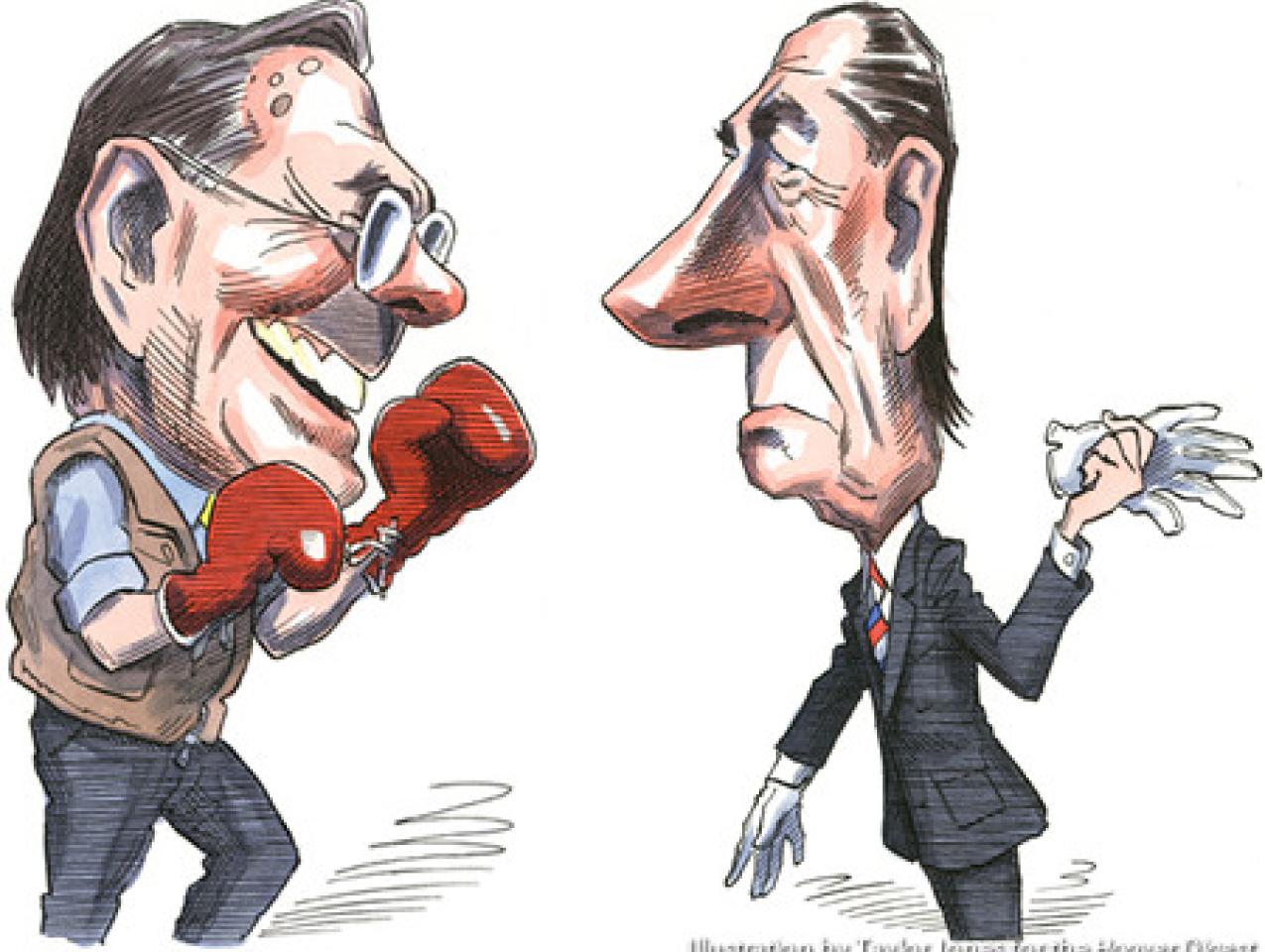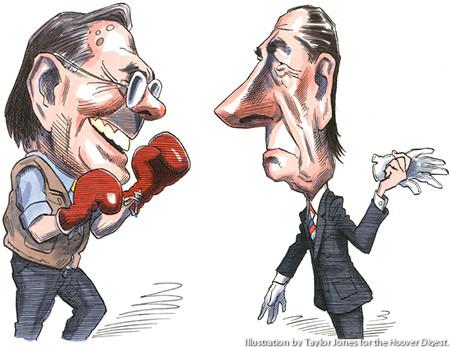- Security & Defense
- US Defense
- International Affairs
- US Foreign Policy
The diplomatic wrangling that led up to the Iraq war has left relations between the United States and some of its European allies severely strained.
The traditionally strong ties to Germany came under pressure first, when Chancellor Gerhard Schröder put rejection of American Iraq policy at the center of his reelection campaign. France quickly followed suit, and the oppositional front of the two major continental European states grew into an important diplomatic challenge to Washington. If there ever had been a chance that Saddam Hussein might have opted for genuine arms inspections, the evidence of the deep rift in the Western alliance surely encouraged him to stay his course and stall. Why give in if he could count on European support? The transatlantic rift also encouraged other nations to oppose Washington or, at least, to try to sit it out on the sidelines.
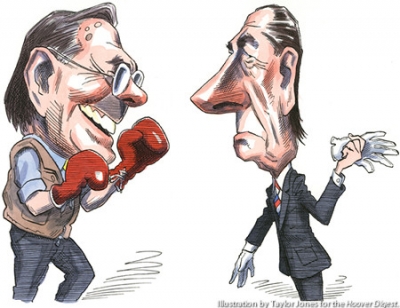
As the war proceeded, popular ill will spread on both sides of the Atlantic. It was in this climate that “freedom fries” and calls for boycotts of French products sprang up in the United States. Likewise, Europeans demonstrated in the streets and issued similar boycott appeals on American products. Anti-American sentiment clearly continues to run very high in Europe. The vast majority of the French blame the war on the Americans, rather than on Saddam Hussein. Indeed, according to Le Monde of March 31, 2003, Americans should expect no particular sympathy for battlefield losses, since nearly as many French were on the side of the Iraqis as were on the side of the United States and England. French demonstrators were not only against the war; they were also often quite explicitly for Saddam. In that context, the refusal of the French leadership to indicate support for an allied victory became a very sad public spectacle.
In the long run (and probably sooner than that), however, these animosities will make way for the practical imperatives of realistic relations and shared interests. Transatlantic trade is too interwoven, too many institutions are interlocked, and too much history has been shared for the disagreement over Iraq to produce a definitive rupture between the United States and Europe. Boycotts will prove much less likely than business as usual, and cooler heads on all sides are wisely calling for a toning down of the rhetoric. As American troops began to secure Iraq, European politicians who had opposed the United States suddenly began to declare that regime change might be a desirable outcome after all. By early April, for example, even Gerhard Schröder decided that it might be advantageous to rebuild the bridges to Washington that he had damaged earlier.
Yet it is difficult to imagine a return to a status quo ante. Although France and Germany did allow overflight rights, and Germany in particular provided other important logistic support, they have obviously put the United States on notice that they cannot be counted on in an emergency. We should face this fact soberly and without animus. It is true, as many currently argue, that the United States cannot “go it alone.” The United States needs allies and should act in concert with them. This does not mean, however, that United States foreign policy in pursuit of its national interest should be subject to the veto of politicians in Berlin or Paris, who are prepared to play an anti-American card for domestic electoral purposes. In fact, the debate over the Iraq war represents a watershed in U.S.-European relations. It is time to think through the shape of those relations in a post-war Europe.
The disappearance of the Soviet threat undermined the traditional Cold War rationale for strong transatlantic relations. During the 1990s NATO and other institutions cast about for new self-definitions, without much success. The Iraq war has brought this underlying crisis to the surface. It is important to remember, however, that it was not the United States that broke the spirit of multilateralism. It was first Germany—unified and no longer the frontline state that was dependent on American protection from the Red Army—that adopted a rejectionist position: It would not participate in an
Iraq war even if the United Nations were to sanction it.
This German dismissal of the standing of the international organization had the advantage of frankness. In contrast, the French engaged in the U.N. process, while actually pursuing a policy to block the United States at all points and even undermining the last-minute compromise floated by England. In retrospect, it is clear that no argument and no proof would have been able to sway France and that its vote for Resolution 1441, which promised “serious consequences,” was undertaken in bad faith. Multilateralism in the form of the United Nations has been harmed because European countries used it as a vehicle to restrain the United States rather than to disarm Iraq. The hypocrisy of current European calls for American multilateralism is evident.
Europe does not speak with one voice, however, and future American policy must take into account the deep splits within Europe that erupted in the context of the Iraq crisis. Long-standing differences between the United Kingdom and continental Europe have only grown worse. Given the current animosity between London and Paris, any further integration across the Channel appears in doubt. Yet England’s difficulties with Europe, as well as its special relationship with the United States, are a familiar story. Of greater interest is the divide between so-called old and new Europe, as Donald Rumsfeld put it (that is, between a Western Europe dominated by France and Germany and the formerly socialist countries of Central and Eastern Europe). As controversial as Rumsfeld’s characterization was, it was promptly confirmed by Jacques Chirac’s imperious outburst, in which he berated the new European countries that had the gall to side with the United States. From the standpoint of the annoyed French president, they had “missed a great opportunity to shut up.” Throughout the new Europe irate responses followed. As one Czech politician put it, Chirac had enunciated a new version of the Brezhnev doctrine of limited sovereignty, as if membership in the European Union meant ceding autonomy over foreign policy to France. Intra-European multilateralism clearly has a long way to go.
That France and Germany have established a de facto alliance with Russia has only exacerbated concern in the new democracies of the East. Still, Europe is riven with other splits as well. To the south, the political leadership in Italy and Spain have sided explicitly with the United States, as have two smaller northern European countries, the Netherlands and Denmark. It is simply not the case that the United States has lost support in Europe. On the contrary, a ring of countries friendly to the American position surround France and Germany, who find clear support only in Belgium. Belgium is caught up in its own absurdities; under its law of “universal jurisdiction” it may soon attempt to bring former president Bush, Vice President Cheney, and Secretary of State Colin Powell to trial for their roles in the first war with Iraq. Whether or not this legal process goes very far, it is indicative of the curious political culture at the heart of “old Europe.”
There is even a conflict brewing between Paris and Berlin. When Europeans call on the United States for greater multilateralism, they typically mean greater respect for the United Nations. Yet the history of the United Nations during the 1990s has been less than glorious, and there is a growing recognition of the need for reform. Any rethinking of the United Nations is very likely to raise the question of the Security Council and its composition, and there’s the rub. Given the size of their contributions to the U.N. budget, the Germans feel they ought to be on the council, while the rationale for the French seat is less and less clear. Why France, rather than India or Japan? When it comes to redesigning the Security Council, Germany will not likely be eager to subordinate its long-standing aspirations for a permanent seat to French interests in maintaining the current arrangement. This conflict will not be pretty.
Rebuilding transatlantic relations therefore means recognizing intra-European complexities, rather than focusing solely on the two large states that define “old Europe.” The alternative, though, is not only the “new Europe” of the East, with its predisposition to side with the United States as the force that ended the Cold War. It is useful to think of the “other Europe,” the full range of small and medium-sized states, which, for various reasons, resists Franco-German predominance—not only in the East but in the South and the North as well. Interestingly, these often tend to be the states where deregulation and free market principles have taken hold more strongly, in contrast with France and Germany, where economic reform remains hopelessly stalled. Foreign policy support for the United States in the outer ring of Europe evidently goes hand in hand with economic liberalization and its attendant values of innovation and individualism. In contrast, opposition to the United States is centered in the more bureaucratic regimes, where regulation always counts more than independent initiative.
Despite the constant celebration of European unification, important cultural and institutional differences divide the continent. U.S. policy toward post-war Europe would do well to take this into account affirmatively. Where a comity of values exists, it should be recognized and supported. In particular, it would be important to build cultural ties to the many smaller European countries who see the United States as their natural ally.








